When we were children, we were dependent upon our parents for survival as we were not able to navigate the world without their help. We needed our parents to feed us, clothe us, and take care of us when we were sick. But most of all, we needed our parents to love us. This need for love is hardwired and survival based. Simply put, if your parent(s) loved you, you were more likely to survive. So as children we developed behaviors and beliefs to please our parents, often at the expense of our true selves, because survival was our number one priority. Fast forward to adulthood: at their best these strategies are ineffective and at their worst wreak havoc. Yet, it’s difficult to stop using them, because it literally feels like if we do, we will die. This feeling is often labeled anxiety, which is the body’s natural reaction to danger, and can be broken down into the following responses:
Fight: Protect yourself, yell, hit, do what it takes to be safe!
Flight: Get out of there, fast! Run!
Freeze: Get real quiet, hide. Become invisible.
Fawn: Go along with whatever they say, people please.
For example:
If your parents believed: Children should be seen and not heard
Your strategy might have been: to spend time alone, even when you wanted company. (Freeze)
If your parents believed: You should always obey them, no matter what
Your strategy might have been: To lie about your behavior when you wanted to do something they would disagree with, or to become extremely argumentative and angry. (Fight)
If your parents believed: your feelings were dramatic
Your strategy might have been: to suppress your feelings so as to avoid being shamed for them. (Freeze)
If your parents believed: Conflict should be avoided at all costs
Your strategy might have been: to people please, even at your own expense. (Fawn)
If your parents believed: “bad” children should be spanked or slapped
Your strategy might have been: to run away or not come home for as long as possible (flight) or as you got older, hit back. (Fight)
If your parents believed: In a particular religion
Your strategy might have been: to pretend you believed too, even if you didn’t. (Fawn)
It’s as if you’d been lost at sea for years, wearing a life jacket, when suddenly a boat shows up and rescues you. On the shore, people keep saying, “It’s OK to take off that life jacket now, you don’t need it anymore.” You agree. The life jacket is bulky, itchy, smells, and your clothes look funny over the top of it. Yet, every time you go to take it off, you panic. What if I need it again? Our childhood survival strategies are a lot like that old life jacket.
So How Do I Take The Life Jacket Off?
The first step is to identify the beliefs that are not serving you, and see how they trace back to your childhood. Are you in fight, flight, freeze, or fawn mode? Once you have that awareness, you’ll begin to notice when those beliefs are running the show and your authentic self is screaming and kicking in protest in the background. The third step is to practice speaking up, even when it goes against the survival strategy’s will.
1. Identify the beliefs/strategies
2. Notice the internal struggle
3. Speak your truth
What if Other People Don’t Like it?
They might not. Especially if your behavior is unexpected, other people in your life could be shocked, angry, or upset. For example, if your go to strategy is people pleasing, then the first time you don’t do that, it’s going to cause a stir. Instead of seeing this as proof that you should go back to people pleasing, you could see it for what it is—a necessary step in reclaiming your authentic self.
Isn’t This Just Blaming My Parents?
No. It’s not about blame, it’s about self-awareness, and getting clear on who you are and how you want to live your life now that your survival is not at stake. It’s about being able to show up.
The Benefits of an Authentic Life:
When taking the life jacket off feels overwhelming, it can be helpful to remember the benefits which include living a meaningful, authentic life with less anxiety. Authenticity also supports healthy, connected relationships. Taking off the life jacket means taking some risks. Get support from others who care about you, and then see what actually happens when you show up as your authentic self.



